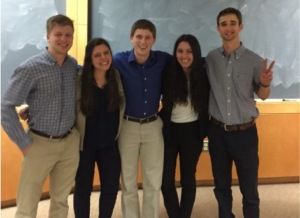News
Greening the Internet of Things – first-ever festival to be held at DTU
This article is more than 8 years old.
The Internet of Things is obviously here to stay; a group of US students are trying to raise awareness of its green potential

Jeremy, Andrea, Jordan, Maria and Liam invite you to the first-ever Green Things Festival
The term ‘Internet of Things’ (IoT) was originally coined by Kevin Ashton of Procter & Gamble in 1999.
It refers to the inter-networking of physical devices, connected devices, smart devices, buildings and other items – all of which contain electronics, software, sensors, actuators and network connectivity that enables the objects to collect and exchange data.
READ ALSO: Tech news in Brief: Faster internet a pricey affair for Denmark
For example, you might have ‘smart’ refrigerators that can monitor consumption and tell the owner when to, for example, order more milk.
Seeing the IoT from a green perspective
However, the IoT has almost limitless potential, and a group of five American students are working together with a Danish start-up, Green Tech Challenge, in trying to raise awareness of the IoT’s ‘green’ applications.
To that end, they are hosting the first-ever Internet of Green Things Festival at the Danish Technical University’s Skylab on April 10 from 14:00-18:00. The festival – which is designed to showcase green startups and their IoT products with interactive and informative demonstrations, presentations and networking opportunities – is open to the general public.
Potential saving in valuable resources
“We believe that the broad implementation of IoT technologies is crucial from an impact perspective,” explained Frederik van Deurs, the co-founder and managing partner of Green Tech Challenge.
“The resources we can save as a society are enormous, and the positive effects from a rising degree of automation will have a serious effect on both private and corporate energy consumption.”
The student team behind it point out that it has been quite a challenge to plan a festival in a country in which they’ve never lived before. However, although they faced some obstacles, they are confident the festival will be a success.
The important thing is that people understand this technology and see how useful it can be in an environmental context.










































